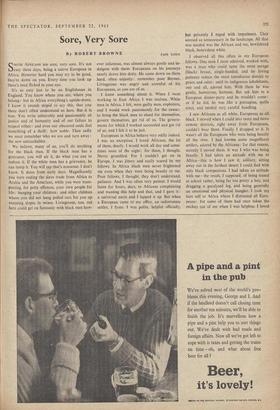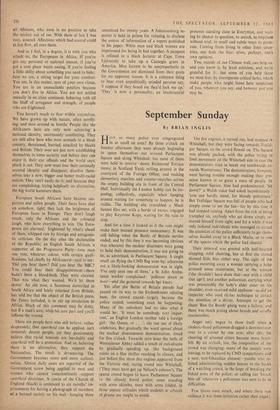By ROBERT BROWNE
CAPE TOWN
SOUTH AFRICANS are sore, very sore. It's not easy these days, being a native European in fkfrica. However hard you may try to be good, they're down on you. Every time you look up there's mud flicked in your eye.
It's so easy just to be an Englishman in England. You know where you are, where you belong: but in Africa everything's upside-down. I know it sounds stupid to say this, that you there don't often understand us here. But it is true. You write admirably and passionately of justice and of humanity and of our failure to respect either: and even our obscured souls feel something of a thrill: how noble. Then sadly we must remember who we are and turn away: the new untouchables.
We believe, many of us, you'll do anything for the black man. If the black man has a grievance, you will air it, do what you can to redress it. If the white man has a grievance, he can lump it. You will say that's nonsense. I don't know. It dates from early days. Magnificently you were ending the slave trade from Africa to Arabia and the Americas, while you were trans- Vorting, for petty offences, your own people for life: hanging your children: and other children whom you did not hang pulled cars Tor you up sweating slopes in mines. Livingstone, too, out here could get on famously with black men how- ever infamous, was almost always gentle and in- dulgent with them. Europeans on his journeys nearly drove him dotty. He came down on them hard, often unjustly: remember poor Baynes. Livingstone was angry and scornful of his Europeans, as you are of us.
1 know something about it. When 1 went working in East Africa I was zealous. White men in Africa, I felt, were guilty men, exploiters, and I would work passionately for the cause: to bring the black men to stand for themselves, govern themselves, get rid of us. The govern- ments for which I worked succeeded and got rid of us; and I felt it to be just.
Europeans in Africa behave very oddly indeed. I was no exception. I loved Africans, the lot of them, dearly. I would work all day and some- times most of the night: for them, I thought. Never grumbled. For I couldn't get on in Europe, I was jittery and easily scared by my fellows. In Africa black men never frightened me even when they were being beastly to me. Poor fellows, I thought, they don't understand, patience. And I was often very patient. I would listen for hours, days, to Africans complaining and wanting this help and that, and I gave it: a universal uncle and I lapped it up. But when a European came to my office, an unfortunate settler, I froze. I was polite, helpful officially, but privately I raged with impatience. They was needed was the African and.me, bewildered black, benevolent white.
I observed all this often in my European fellows. One man 1 most admired, worked with, was a man who could tame the most savage (black) breast, single-handed, and by loving patience reduce the most tumultuous district to peace and calm: until its indigenous inhabitants, one and all, adored him. With them he was gentle, humorous, humane. But ask him to a European dinner-party and he wouldn't come: or if he did, he was like a porcupine, quills erect, and needed very careful handling.
I saw Africans as all white, Europeans as all black. I moved when I could into more and more remote districts, right away from Europeans, couldn't bear them. Finally I dropped to it. It wasn't all the Europeans who were being beastly all the time. I had known some magnificent settlers, adored by the Africans: for that reason, secretly 1 envied them. It was I who was being beastly. I had taken an attitude with me to Africa—this is how I saw it, solitary, sitting away out in the farthest desert I could find with only black companions. I had taken an attitude with me—the result, I supposed, of being teased at school rather, being far too pretty a boy, and dragging a paralysed leg, and being generally an emotional and physical bungler. I took my hurt self to Africa where I distrusted all Euro- peans: for some of them had once taken the mickey out of me when I was helpless. I loved all, Africans, who were • in no position to take the mickey out of me. With them at last I was easy, assured. Affections which had soured could at last flow, all over them.
And so I feel, in a degree, it is with you who attack us, the Europeans in Africa. If you've got any personal or national unease, if you've got a sore place wants easing, if you're feeling I little shifty about something you need to hide: here we are, a sitting target for your comfort. You are, in this matter, sure of your own virtue. You are in an unassailable position because you don't live in Africa. You are not settled uneasily in an alien continent, behaving with all the bluff of arrogance and strength, of people who are frightened.
You haven't much to fear within yourselves. We have grown up with nature, often terrify- ing, and men around us hostile. People like the Afrikaners here are only now achieving a national identity, enormously comforting. They are still alive here who were nomads in a bleak country, threatened, harried, attacked by blacks and British. Their sons are just now establishing themselves in some security and before they can enjoy it, their eye offends and the world says, pluck it out. They now must lose their anxiously secured identity and disappear, dissolve them- selves into a new, bigger and better multi-racial nation: They can't easily do it; and because they are complaining, trying helplessly an alternative, the big world hammers them.
European South Africans have become sus- picious and sullen people. Their faces have shut up somehow, tight; they lack the brightness of European faces in Europe. They don't laugh much; only the Africans and the coloured laugh, who have everything to win. The Euro- peans are alarmed: frightened by what's ahead of them, whipped raw by foreign and antagonis- tic criticism. On the day after the declaration of the Republic, an English South African, a supporter of the Progressive Party—(one man one vote, whatever colour, with certain quali- fications; led chiefly by Afrikaners)—said to me: 'Did you hear them? Did you hear the BBC? You could hear their disappointment--there hadn't been a blood-bath. They were cheated. That was what they wanted. We'd let them down.' An old man, a Scotsman domiciled in South Africa and lately returned from Britain, has told me that the object of the British press, the Times included, is to stir up revolution in Africa. Much of this comment may be dotty, but if a man's sore, whip his sore part and you'll inflame the wound.
There are people here who still believe, rather desperately, that apartheid can be applied, isn't immoral; decent people, yet they passionately believe that racial tensions are inevitable and apartheid will be a protection. And so, believing there is no alternative, they support the Nationalists. The result is devastating. The Government becomes more and more authori- tarian. Almost daily cases arc reported of the Government screw being applied to men and women who cannot conscientiously -support apartheid doctrines. A canon of the Church of England (black) is sentenced to six months' im- prisonment for having a photograph of members of a banned society on his wall—hanging there unnoticed for twenty years. A Johannesburg re- porter is held in prison for refusing to disclose the source of information of a report published in his paper. White men and black women are imprisoned for being in bed together. A passport is refused to a black lecturer at Cape Town Upiversity to take up a Carnegie grant in America. Men known to be unsympathetic to the Government are dismissed from their posts for no apparent reason. It is a common thing to hear even unpolitically minded persons say, 'I suppose if they heard me they'd lock me up.' `They' is now a personality, an insubstantial presence standing close to Everyman, and wait- ing its chance to question, to search, to imprison without trial, in small and subtle ways to perse- cute. Coming from living in other freer coun- tries, one feels the fear; trims, perhaps, one's own opinions.
You, outside of our Chinese wall, can help us, and you know it, by level criticism, and we're grateful for it: but some of you help those we most fear, by intemperate critical larks, which make people who might listen here suspicious of you, whatever you say, and however just you may be.











































 Previous page
Previous page